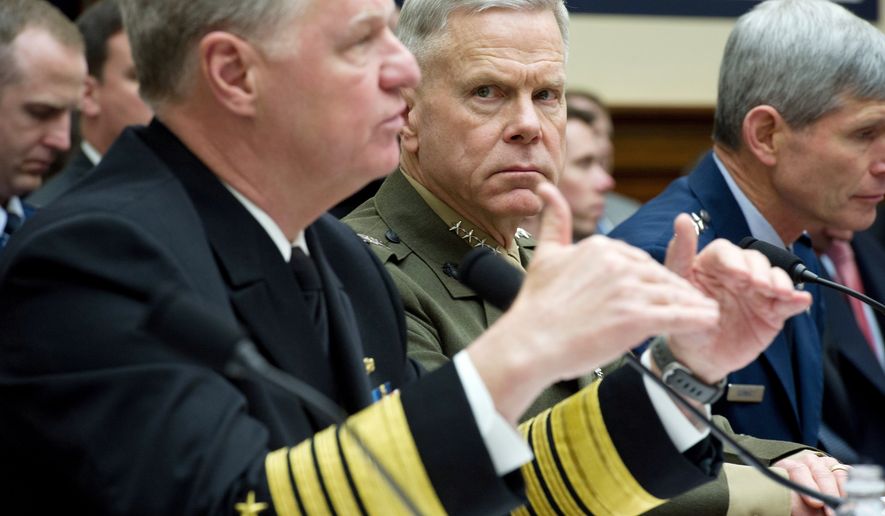Preparations for repealing the military’s ban on openly homosexual service members have proceeded very well — even among Marines, who have not demonstrated any resistance, the Marine Corps commandant testified Thursday.
“There hasn’t been the recalcitrance or push-back. There has not been the anxiety over it from the forces in the field,” Gen. James F. Amos told the House Armed Services Committee, which held a hearing Thursday on repealing the “don’t ask, don’t tell” policy.
Gen. Amos had opposed the Obama administration’s plan to repeal the 17-year-old policy, which requires gays to be discharged if they divulge their sexuality.
What’s more, in a survey of military personnel about the issue last year, the Marine Corps had the largest percentage of service members — well over 50 percent — who strongly opposed repealing “don’t ask, don’t tell.”
To carry out the administration’s plan, the four armed services have begun sending training material to 2.2 million active-duty and reserve personnel in preparation for accepting open homosexuals.
“I’m looking specifically for issues,” Gen. Amos said of the preparatory training. “We’ve not seen it.”
He and the chiefs of the Army, Navy and Air Force testified that preparations to allow homosexuals to serve openly are going well, although they cautioned there is still a long way to go to fully implement the proposed new policy.
Gen. Amos said he held a video conference Thursday with the Marine commander in Helmand province in Afghanistan and talked about the repeal of “don’t ask, don’t tell.” The commander said “he doesn’t think it’s an issue” for Marines there, who were focused on combat, but that “maybe they’ll have questions when they return back to the United States,” the general said.
Gen. Norton Schwartz, Air Force chief of staff, said he was “more comfortable” with the upcoming repeal than he was in December, when the service chiefs last addressed the issue.
Congress approved repealing “don’t ask, don’t tell” in December. But the policy remains in effect until the president and the Pentagon certify that the change will not hurt military readiness. The repeal becomes effective 60 days after that certification.
In Iraq on Thursday, Defense Secretary Robert M. Gates told troops at Camp Liberty outside of Baghdad that the repeal implementation is going smoothly and that they should expect little change in how they serve.
“My guess is you won’t see much change at all,” Mr. Gates said in response to a question about what service members could expect as a result of the repeal.
Mr. Gates said the military is in the third and final stage of preparation for the repeal. Having drafted new regulations and prepared training materials, the services now are training specialized instructors who will train senior officers, then more-junior personnel.
The service chiefs said they expect the training to be complete by the summer.
“The whole thrust of the training is you’re supposed to go on treating everybody like you’re supposed to be treating everybody now — with dignity, respect and discipline,” Mr. Gates said.
At Thursday’s hearing, the Armed Services Committee chairman said he was troubled by the process employed to set the stage for the repeal.
Rep. Howard P. “Buck” McKeon, California Republican, also accused the Obama administration of a “rush to judgment that bypassed this committee,” saying it denied Congress “the opportunity to ask questions and identify weaknesses in the repeal implementation plan.”
Under the plan, the service chiefs make recommendations about certifying whether the military is ready for the change.
“I am confident that my recommendation will be heard,” said Adm. Gary Roughead, chief of naval operations, in response to suggestions that the certification might be a rubber stamp.
Answering questions from Rep. Duncan Hunter, California Republican, Adm. Roughead acknowledged, “We don’t yet know how this will improve combat effectiveness.” But he added, “Inclusive organizations are usually the best kind of organizations.”
Gen. Amos said the repeal would bring “peace of mind” to gay Marines who currently are serving under the threat of discharge, but added that he could not rule out the possibility that other Marines might resign as a result of the change.
Rep. Vicky Hartzler, Missouri Republican, made an impassioned plea for the service chiefs not to certify that their services are ready for openly homosexual personnel.
“We are at war,” she said, “and yet we are talking about one of the most monumental changes in policy [in U.S. military history].
“It has fallen upon you at this moment in history,” Mrs. Hartzler told the chiefs. “You can stop this.”
Thomas Sears, executive director of the Center for Military Readiness, told The Washington Times that the hearing showed the “deep and broad skepticism — to say the least — among Republicans.”
The center is an educational nonprofit that advocates for “sound military personnel policies” and has opposed the repeal. “There will be more hearings, I have that on good authority,” Mr. Sears said.
J. Alexander Nicholson III, executive director of Servicemembers United, which supports lifting the ban, told The Times that the hearing “reaffirmed what we already knew: That repeal is inevitable.”
“The service chiefs have been pretty clear in their professional opinion,” he said. “They’re comfortable with the change. They’re comfortable with the preparations for implementation.”
He accused the committee leadership of a “waste of taxpayer dollars and the time of the military leadership” in an effort to “find [media] sound bites that will derail this process.”
• Shaun Waterman can be reached at 123@example.com.




Please read our comment policy before commenting.